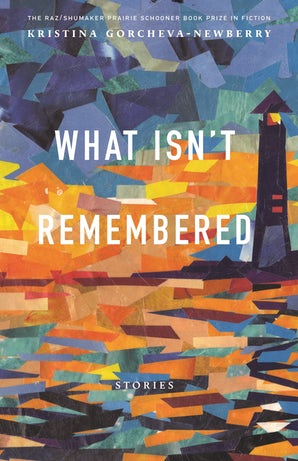An Exchange of Energy
What Isn’t Remembered by Kristina Gorcheva-Newberry
University of Nebraska Press (2021)
Reviewed by Sean Dolan

In her lyrical and harrowing debut story collection, What Isn’t Remembered, Kristina Gorcheva-Newberry provides her readers with the most valuable opportunity in fiction: to empathize with strangers on the page. In “Boys on the Moshka River,” the heartbreaking, evocative opening story, the narrative oscillates between childhood and the ramifications of death for two brothers in perestroika-era Soviet Union. Newberry wastes no time beginning her collection. She writes, “When my brother died in the winter of 1998, the snow fell all night and all the following week, so they didn’t find him right away, the contour of his body barely delineated but otherwise indistinguishable from the shrouded, ice-etched forms.” The reader has been warned of what is to come: stories that diminish the boundaries between reader and character, creating transactions and encounters that refuse to be forgotten.
The best stories ask readers to not only empathize with their characters, but also to embody them, to explore what it means to be a certain someone or something. The writers of these stories invite their readers to meet them on the page, encouraging them to participate in the act of humanity, providing an exchange of energy. As readers, we are lucky when characters jump off the page in this way, telling stories that often feel more real than life itself. Likewise, we’re lucky to have Kristina Gorcheva-Newberry, and her collective of characters.
Other standout stories include “All of Me,” in which two friends–different in more ways than one–discuss their marriage and fidelity, speaking out loud what is often difficult to say, like when the first person narrator discusses her desire and lack thereof: “You can’t reclaim your desire for one person by sleeping with another.” And in “No Other Love,” a woman reunites with her estranged mother and engages in an affair over the course of a tumultuous, transformative year, in what may be the best story of the collection. Her words at the end of the piece remain with me. Gorcheva-Newberry writes, “All I knew at the moment was that Valeriy was wrong – once you voiced your desire, you owned it, from the first choked sigh to the full-throated moan; and that Bonnie was right, at least partially – the stars did give you the loneliest feeling, but not unbearable, and only until dawn.”
Of course, these three stories are only an example of the myriad ways in which Gorcheva-Newberry gives life to her characters. Sixteen stories comprise this Raz/Shumaker Prairie Schooner Book Prize in Fiction winner, each one powerful and potent in its own way, often revolving around immigration, displacement, and being far from home. For fans of lyrical fiction with gorgeous syntax, stories that beg to be read out loud, check out “And What Rough Beast,” a story the Bellingham Review was lucky enough to publish in our Spring 2018 issue. “Simple Song #9” and “Second Person” subvert expectations of both narrative and form, the former resisting to name characters in a detached, yet tender, omniscient third person point-of-view, while the latter, hence the name, is a story told in the second person, reminiscent of Lorrie Moore in both style and soul. Stories such as “The Heart of Things” and “The Suicide Note” grapple with death in unexpected and unrelenting fashion, leaving the reader transfixed in ways that feel unfamiliar.
Kristina Gorcheva-Newbery is a writer to watch out for. What Isn’t Remembered, also longlisted for the PEN/Robert W. Bingham Prize, is a triumph in every sense. Furthermore, her debut novel, The Orchard, is set for publication on March 15, 2022, from Ballantine Books, an imprint of Penguin Random House. These stories will linger in readers’ minds for weeks, even months after they are finished. Isn’t that, as readers, what we really desire? Maybe all we want is to experience transformation, and then to find ourselves at another point in time, long after the story has finished, remembering the way it made us feel, desperate and delirious.
Sean Dolan is a writer from Missouri. He is currently an MFA candidate in fiction at Western Washington University. His fiction has appeared in Hobart, 805 Lit + Art, The Los Angeles Review, and elsewhere. You can find him on Twitter @SyannDoelann.
Featured image, “Pilbara, NW Australia” from NASA